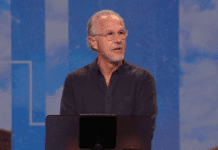As the Israelites were living in the midst of the Amorites at the time and feeling the pressure to conform to that culture, so now we are living in a time and place where multiple voices are telling us what to do. We’re hearing voices telling us “how to live, how to operate, how to move, what we ought to say, how we ought to feel.” In these verses, Joshua is essentially saying “I have made a decision that my decisions will be defined, not by the culture around me, but by the Christ inside of me. By my commitment to the will and word of God.” Joshua is warning the Israelites against “spiritually compromising” as they live among the Amorites.
Today, Evans says many men are spiritually compromising. “They are one way in church but then they go secular as soon as they leave church.”
The Israelites are warned against serving idols, which in that time in history were physical things that people bowed down before and made sacrifices to. In our day and age, Evans explains, “Anything or anyone (including you) that can overrule God means that is an idol in your life.” God can’t be second and he will not allow any competing deities. He has what Evans calls an “exclusivity clause.”
“With all that we are facing today, you better have God on your side,” Evans says emphatically.
Three Hallmarks of Joshua’s Declaration
Joshua’s decision is a personal decision. In the same way, men today need to know that the decision to follow God “can’t be made by anyone but you as a man, as a husband.” Evans says too many men today “are like jellyfish…they have no backbone, they just go with the current. They don’t take a stand. I don’t mean being mean, but I do mean being clear. That ‘I follow Jesus Christ.’ Everybody else is saying who they follow. Why should we be ambiguous as men about who we follow?”
Joshua broadens his decision to include his house. By saying “and my house,” Joshua “takes responsibility for his family.” Why does he make a declaration and not ask for a vote, Evans asks. “Because in the Bible the father would be held responsible by God for the direction of his family.” A Kingdom man accepts responsibility under God. Not even your wife gets to make the final decision, Evans says. Explaining this, Evans says Adam got in trouble when he allowed Eve to overrule God’s instructions in the Garden of Eden.
Joshua’s is a “covering statement,” Evans argues. “Unless a man lets God cover him, he can’t properly cover his loved ones.”
Finally, Joshua’s is not only a personal commitment, a family declaration, but also a “culture-wide declaration,” when he addresses the culture by saying “If it is undesirable to you…”
Evans Challenges Men to Make a Public Declaration
Bringing this back to our current culture, Evans says we need men to go public with their Christian faith like Joshua did. We are facing all kinds of pandemics right now: “We’ve got a health pandemic, a racial pandemic, a police and community pandemic, we’ve got clashes going everywhere.” The best solution to these pandemics, Evans believes, is “godly men taking their place and speaking about what God says about racial injustice, what God says about order, what God says about healing wounds, what God says about how we relate to other people, what God says about the role of government, what God says about how institutions ought to operate…” Evans says God has given direction on all of these things.
Evans is careful to note that Joshua didn’t put himself in the position of disagreeing with people just to be disagreeable or just to be different. And his declaration was not meant simply to be lip service, either. Joshua declared with his mouth and with his actions that his household would be serving God by word and deed.
There’s a warning in Evans’ Father’s Day sermon that he doesn’t want men to miss: “There’s a culture out there that doesn’t want men of God to succeed….While our goal is to move forward, there will be resistance. And that is why you need God on your side.”
God relates to us based on how we handle the relationship with him. Going back to Joshua, in the next several verses following Joshua’s declaration, the Israelites make a covenant with God. Evans again uses a football analogy to explain a covenant. The game of football uses the ball as the benchmark for every ruling in the game. For example, a touchdown is determined if the football has broken the plane of the end zone; a field goal on whether the ball has gone through the uprights; an offsides ruling is based on where the players are in relation to the football; out of bounds is determined by where the player has taken the football. Everything revolves around where people are in relation to the football. Likening the football to the covenant or the agreement we make with God, Evans asks “Are we relating to him and are we ruling underneath him?” In other words, where are we in relation to the covenant or the relationship?
Addressing fathers specifically, Evans says perhaps you’ve walked away from your family. The pastor says God provides men the opportunity to get back in alignment with him, and whenever possible, back in alignment with their families.
“You’ve got a culture that wants to trick you and trip you up,” Evans says. “The answer is in your choice. Do you choose to follow him or not?” If you choose to follow him, “then we ought to know about, your family ought to know about it, your friends ought to know about it, the culture ought to know about it, and when God sees it, you’ll see God act through it to make a difference in your life and our world.”












